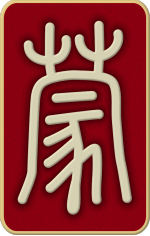
蒙 Méng Inexperience (Childhood) [hexagram 4]


Mountain over Water
 Earth element
Earth element
Lunar month: 1 ; Host (controlling) line : 2
The Decision
Children seeking advancement. They seek me out for enlightenment; on their first consultation encourage but on repeated attempts withhold instruction. It is beneficial to remain resolute.
Below the rugged mountain is a hazardous stream. There will be good progress at the appropriate time. ‘They seek me out for enlightenment’ because they understand a shared purpose. ‘On the first consultation encourage’ because of its central place. ‘On repeated attempts withhold instruction’ because this causes annoyance. To nourish virtue in the young is the action of a sage.
蒙: 亨. 匪我求童蒙, 童蒙求我. 初筮告, 再三渎, 渎则不告. 利贞.Méng: hēng. Fěi wǒ qiú tóng méng, tóng méng qiú wǒ. Chū shì gào, zài sān dú, dú zé bù gào. lì zhē.
彖传: 蒙, 山下有险, 险而止, 蒙. 蒙亨, 以亨行时中也. 匪我求童蒙, 童蒙求我, 志应也. 初噬告, 以刚中也. 再三渎, 渎则不告, 渎蒙也. 蒙以养正, 圣功也. Tuàn zhuàn: Méng, shān xià yǒu xiǎn, xiǎn ér zhǐ, méng. méng hēng, yǐ hēng háng shí zhōng yě. fěi wǒ qiú tóng méng, tóng méng qiú wǒ, zhì yìng yě. chū shì gào, yǐ gāng zhōng yě. zài sān dú, dú zé bù gào, dúméng yě. Méng yǐ yǎng zhēng, shèng gōng yě.
The Image
A spring flowing from a mountain denotes inexperience. The wise make every effort to strive towards virtuous acts.
象传: 山下出泉, 蒙; 君子以果行育德. Xiàng zhuàn: Shān xià chū quán, méng; jūn zǐ yǐ guǒ háng yù dé.
Line Change 1
Education requires inducement. Remove limitations to thinking; harsh punishment will be regretted.
‘Education requires inducement’ – setting goals and rules.
初六: 发蒙, 利用刑人, 用说桎梏, 以往吝. Chū liù: fā méng, lì yòng xíng rén, yòng shuì zhì gù, yǐ wǎng lìn.
象传: 利用刑人, 以正法也. Xiàng zhuàn: Lì yòng xíng rén, yǐ zhèng fǎ yě.
Line Change 2
Be patient with the uneducated earns favor. Marriage will also be favorable by way of nurturing a family.
‘Nurturing a family’ – because the strong and weak lines interact.
九二: 包蒙吉; 纳妇吉; 子克家. Jiǔ èr: bāo méng jí; nà fù jí; zǐ kè jiā.
象传: 子克家, 刚柔接也. Xiàng zhuàn: Zǐ kè jiā, gāng róu jiē yě.
Line Change 3
Avoid marrying a person who will be lost to someone more attractive or wealthy. It is unfavorable.
‘Avoid marrying a person’ – as their conduct is unbecoming.
六三: 勿用取女; 见金夫, 不有躬, 无攸利. Liù sān: wù yòng qǔ nǚ; jiàn jīn fū, bù yǒu gōng, wú yōu lì.
象传: 勿用取女, 行不顺也. Xiàng zhuàn: Wù yòng qǔ nǚ, háng bù shùn yě.
Line Change 4
If fail to educate there will be regret.
‘Fail to educate’ – because distant from reality.
六四: 困蒙, 吝. Liù sì: kùn méng, lìn.
象传: 困蒙之吝, 独远实也. Xiàng zhuàn: Kùn méng zhī lìn, dú yuǎn shí yě.
Line Change 5
Gaining experience. Good fortune.
‘Gaining experience’ brings good fortune because receptive and humble.
六五: 童蒙, 吉. Liù wǔ: tóng méng, jí.
象传: 童蒙之吉, 顺以巽也. Xiàng zhuàn: Tóng méng zhī jí, shùn yǐ xùn yě.
Line Change 6
Punishing the uneducated has no benefit. Only act in self-defense.
‘Only act in self-defense’ as those above and below are positioned appropriately.
上九: 击蒙; 不利为寇, 利御寇. Shǎng jiǔ: jī méng; bù lì wéi kòu, lì yù kòu.
象传: 利用御寇, 上下顺也. Xiàng zhuàn: Lì yòng yù kòu, shàng xià shùn yě.
The full set of 64 English translations is available in our new book 'Book of Changes - Deciphered' ➚.